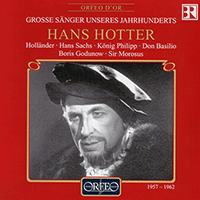Meinhard von Zallinger
Born into an aristocratic Austrian family, Meinhard von Zallinger was a student at Innsbruck and at the Salzburg Mozarteum, with which he maintained strong links throughout his life. He was a conductor for the Mozarteum’s opera performances between 1920 and 1922, and in 1923 his piano arrangements of two comic operas by his Salzburg colleague Bernhard Paumgartner were published by Universal Edition in Vienna. He conducted in Munich during 1926, and then spent six years in Cologne from 1929 to 1935, before returning to Munich as a house conductor during Clemens Krauss’s highly influential period as chief conductor (1935–1944). After World War II, Zallinger served as conductor of the Salzburg Landestheater and of the Mozarteum Orchestra from 1947, and was appointed chief conductor at Graz in 1949. The following year he moved to the Vienna State Opera (then performing at the Theater an der Wien), and three years later took up the post of chief conductor at the Komische Oper in Berlin, then establishing itself for dramatic originality under the direction of Walter Felsenstein. He returned for a third time to Munich as a house conductor in 1956, while also teaching conducting at the Salzburg Mozarteum and later guest conducting in Italy.
Zallinger’s discography is very small, but is characterized throughout by a notable sense of energy and of style. He was very highly regarded by H. C. Robbins Landon, who has described him as ‘a supremely professional operatic conductor’. Robbins Landon engaged him to conduct the first complete recording of Mozart’s Idomeneo for the Haydn Society, a performance which can still hold its own against later competition. He also persuaded George Mendelssohn, the founder of the Vox label, to hire Zallinger to conduct the recording of Haydn’s then recently-discovered puppet opera Philemon und Baucis. In addition to these commercial recordings, Zallinger was active in the Viennese studios of Austrian Radio: he led a much-reissued recording of Weber’s Euryanthe, with Maria Reining in the title role, and a rarer account of Puccini’s La rondine (its first performance in Vienna) in a German translation with Ljuba Welitsch and Anton Dermota as the two principals. In complete contrast to this repertoire, Zallinger also conducted at this time, for the American Recording Society, the Vienna Symphony Orchestra in the American composer John Alden Carpenter’s Skyscrapers. He then did not appear on disc for several years, until 1962, when he conducted the forces of the Bavarian State Opera in excerpts from Tchaikosky’s Eugene Onegin and The Queen of Spades for EMI-Electrola. Once again he demonstrated his capacity to establish an appropriate sense of atmosphere, here supporting Fritz Wunderlich as the doomed tenor hero of both operas.
© Naxos Rights International Ltd. — David Patmore (A–Z of Conductors, Naxos 8.558087–90).

















